The Nigerians bowled over by cricket
- Published
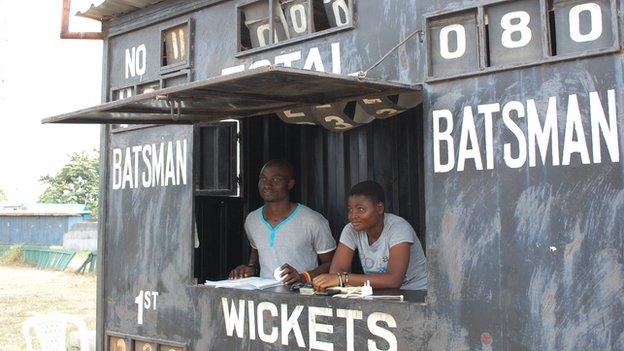
Nigeria has produced its fair share of great sportsmen and women - but unlike footballers and polo players, cricketers rarely get the West African nation's heart beating.
Cricket and Nigeria may seem an incongruous pairing, but in Lagos many a weekend players in their colourful kit take to the crease on a dusty pitch in a fiercely competitive cricket league.
"This league actually boasts about 99% of the Nigerian national team," says Femi Solebo, who chairs the Club Cricket Committee Lagos and also plays for the Ibeju Lekki Cricket Club.
Watching a game from the welcome shade of the pavilion, he occasionally shouts out instructions to his batsmen taking on Government College Ibadan in a 50-over game.
"Over the last three or four years Nigerian cricket has stepped up quite a lot and has allowed these guys here to show their stuff at an international level," he says.
"Recently the national team got promoted to division five in the World Cricket League, which is a huge achievement for us - we've never been there before in the history of Nigerian cricket."
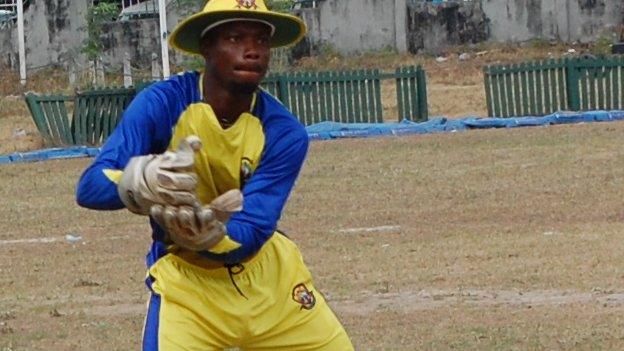
The Lagos league games start at about 10:00 on the weekends
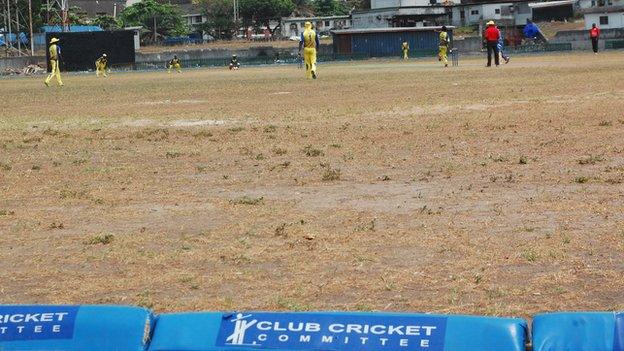
And if each side plays its 50 overs, a game can go on till 16:30
Mr Solebo, who first started playing cricket whilst at school in the UK, reckons that in a population of more than 170 million "there must be a million or so followers of cricket in Nigeria quite easily".
However, not many of them are at Tafawa Balewa Square Cricket Oval next to Lagos' dilapidated old racecourse.
Live updates
Besides a few team members on the stand and a man barbecuing meat, only a small group watches from deckchairs under a nearby tree, keeping refreshed with drinks from a cool box.
Some of them turn out to be former Nigerian internationals - stalwarts of the game, some of whom are updating a chat group of enthusiasts with the latest scores by mobile phone.

Femi Solebo, Club Cricket Committee Lagos chair:
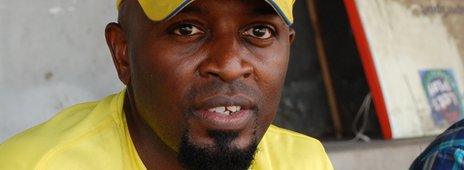
I joke with them that if I don't fund them, they're going to come mug me

"In our time we didn't have as much exposure as the current national team does, we were restricted in playing in just the West African region," says Barnaby Ephraim, who now helps administer the game in Lagos.
He says it is the Lagos league, which was started more than 15 years ago, that has helped raise the profile of cricket and the opportunity to play it outside school and university.
It is also tempering attitudes that see the game as elitist and old fashioned, with some schools - even the established private ones - not seeing the sport as a priority.
And Mr Solebo admits it is difficult to rival football as there are not the fans to warrant tickets that would pay for the upkeep of a turf pitch.
The ground the teams use is often rented out by the cash-strapped Nigerian Cricket Federation - and with upcoming elections, political rallies have recently been held here, playing havoc with the pitch, already like concrete after the dry Harmattan season.
The game is also expensive for players given the kit needed.
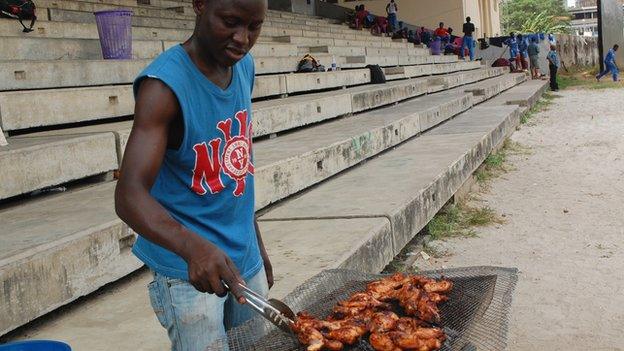
There are few spectators unless there is a final which can attract a crowd of several hundred people
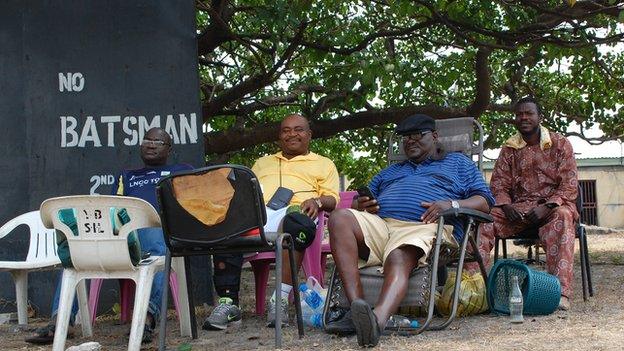
Amongst the loyal fans are a few former cricketing internationals
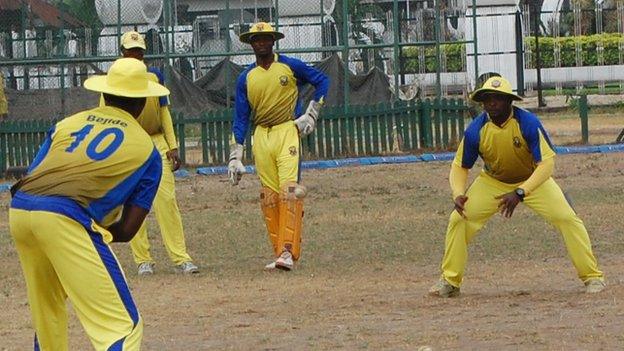
Astroturf is used for the wicket in Nigeria, which disadvantages players when they play internationally
"With soccer, all you need is just one ball and then you're away," says the 45-year-old.
But he says whilst the league is sponsored by private individuals like him with a passion for the game, most of the 400 players in its two divisions are "from the streets".
The Ibeju Lekki club helps pay for either a player's education or vocational training - and subsidises kit and lunches.

Kunle Adegbola, Nigerian cricket captain:

Cricket is just evolving in Nigeria... in the next four to five years cricket will be out there like football

"Whatever it is they want to do, we'll fund that and insist that you can only be a member of this club if you have some kind of educational background - and that's what the other clubs try to do as well," says Mr Solebo, who runs a company that generates electricity.
"I joke with them that if I don't fund them, they're going to come mug me.
"Some of them are doing very well in university, some of them have left and are working now."
TV deal?
A few of Lagos' cricketers have even gone professional, like Nigerian cricket captain Kunle Adegbola.
The towering 33-year-old has come to practise for his Foundation Cricket Club in the nets ahead of a game the next day.
When the season ends in April in Lagos he will head off to London, where he has played for Burgess Park and Blackheath cricket clubs in the past.
He says with more awareness, spectators and sponsorship, he sees great things for Nigerian cricket.
"Cricket is just evolving in Nigeria... in the next four to five years cricket will be out there like football," he says.
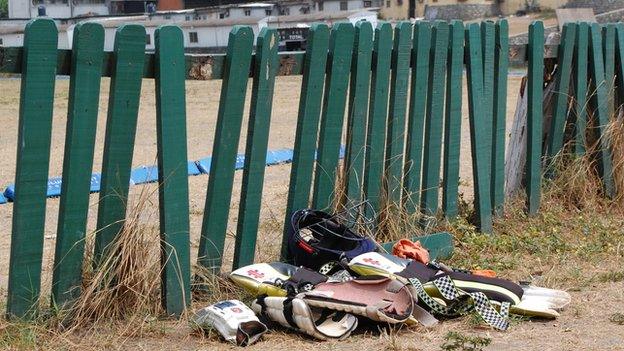
The kit - including a bat, pads and helmet - can be expensive
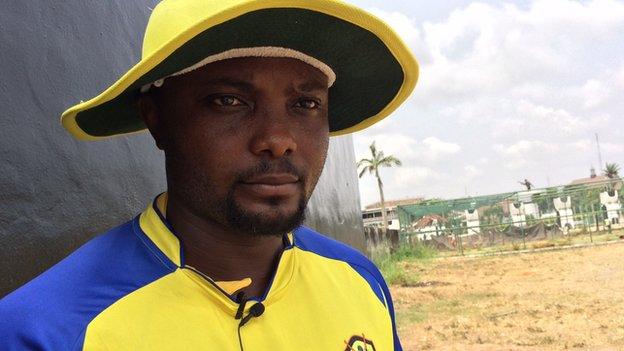
Endurance Ofem feels good benefits would attract young players serious about a cricketing career
But the Lagosian cricketers know gaining such momentum will only be achieved with serious corporate sponsorship - which would be more likely if ongoing negotiations with a cable TV company bear fruit.
So far TV executives have been reluctant to go ahead as they would prefer a national league.
"But we say that we can take it in phases, adopt Lagos first and then you can open up," says Mr Ephraim, vice-chair of the Lagos State Cricket Association which is also trying to rejuvenate youth interest in cricket.
He says that unlike other states there are 35 schools in Lagos now playing cricket - with both boys and girls participating.
Ibeju Lekki player Endurance Ofem agrees junior involvement is key to putting cricket on a football footing.
But the former captain of the Nigerian side says offering national team players good welfare packages like those available to professional footballers is important too.
"If you do that, every youngster sees the reason to come and play cricket."
For Mr Solebo, competing with football is not the issue - it is the cricket that matters.
"It makes me very proud that our efforts give people joy every weekend - they come here, play with passion and it's fantastic."